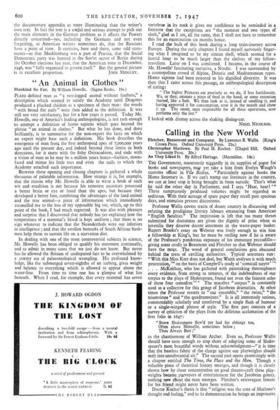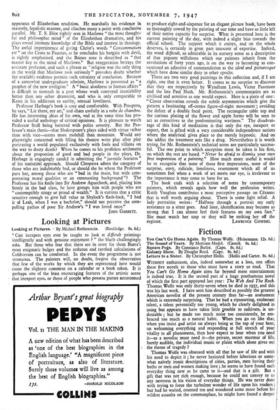Calling in the New World
As They Liked It By Alfred Harbage. (Macmillan. 14s.) Tim Government, notoriously niggardly in its supplies of paper for books and newspapers, may yet take a hint from Evelyn Waugh's customs officer in Vile Bodies. "Particularly against books the Home Secretary is. If we can't stamp out literature in the country, we can at least stop it being brought in from outside. That's what he said the other day in Parliament, and I says ' Hear, hear! ' " These sumptuously produced volumes might be regarded as seditious. With their acreage of spare paper they recall past spacious days, and stimulate present discontents.
Professor Wallis covers tracts of desert country in discussing and refuting the prodigious literary labours emanating from American " English faculties." The impression is left that too many theses submitted for doctorates are given the dignity of print when as juvenilia they deserve decent interment in the waste-paper basket. Rupert Brooke's essay on Webster was lively enough to win him a fellowship at King's, but he must be smiling now if he is aware of the Professor's ponderous exposure of his immature peccadillo— giving scant credit to Beaumont and Fletcher so that Webster should have the more. , The wood of general conclusions gets obscured behind the trees of cavilling authorities. Typical sentences run: " With this Miss Kerr does not deal, but Waith analyses it with much penetration, ' on the basis of Campbell's study of comicall satyre' '" . . . McKeithan, who has gathered with painstaking thoroughness every evidence, From strong to tenuous, of the indebtedness of our corpus to the plays of Shakespeare, found not even the faintest ,echo of these four comedies.' " The macabre " corpus " is constantly used as a collective for this group of Jacobean dramatists. At other times the Professor resorts to " our ensemble," " the twins," " the triumvirate" and "the quadrumvirate." It is all immensely serious, commendably scholarly and unrelieved by a single flash of humour or a single-winged phrase of style. The first part consists of a survey of criticism of the plays from the delirious acclamation of the first folio in 1647:
" Brave Shakespeare flow'd yet had his ebbings too, Often above Himselfe, sometimes below ; Thou Always Best ;" to the chastisement of William Archer. Even so, Professor Wallis should have taste enough to stop short of adapting some of Shake- speare's most beautiful words without acknowledgment—" it is time that the baseless fabric of the charge against our playwrights should melt into unsubstantial air." The second part opens promisingly with a chapter entitled The Time, the Place and the Men. Though a valuable piece of theatrical history emerges, and though it is clearly shown how by sheer concentration on good theatre-craft these play- wrights became,purveyors of entertainment for the Jacobean gentry, nothing new about the men emerges. Fletcher's extravagant lament for his friend might never have been written.
Doctor Kocher's thesis is that "religion was the core of Marlowe's thought and feeling," and to its demonstration he brings an impressive. apparatus of Elizabethan erudition. He marshalls his evidence in masterly, legalistic manner, and clinches many a point with conclusive parallel. Mr. T. S. Eliot rightly sees in Marlowe " the most thought- ful and philosophic mind " of the Elizabethan dramatists, and his plays reveal intimate knowledge of the Bible and interest in theology. The awful impertinence of giving Christ's words "Consummatum est " on the Cross to Faustus, as he concludes his bargain with devil, is rightly emphasised, and the Baines note is described as " that master key to the mind of Marlowe." But exaggeration betrays the assistant professor, and such a phrase as " religion was the only thing in the world that Marlowe took seriously " provokes doubt whether the availab1,2 evidence permits such certainty of conclusion. Because of a somewhat undergraduate atheism, Marlowe is presented as "a prophet of the new irreligion." A " basic aloofness to human affairs " is difficult to stomach in a poet whose work conveyed insatiability better than any other dramatist, and who is only comparable to Keats in his addiction to earthy, sensual loveliness.
Professor Harbage's book is cosy and comfortable. With Prospero, he says," Lie there, my art," and chats usefully in a robe de chambre. He has interesting ideas of his own, And at the same time has pro- vided a useful anthology of critical opinions. It is pleasant to watch Professor Stoll being battered with polite severity. But the Pro- fessor's main thesis—that Shakespeare's plays sided with virtue rather than with vice—seems more molehill than mountain. Would any playwright concerned with filling his theatre write play after play portraying a world populated exclusively with fools and villains on the way to dusty death? When he comes to his profitless arithmetic about the proportion of good and bad people in the plays, Dr. Harbage is engagingly candid in admitting the " juvenile features " of his statistical approach. Should Cleopatra adorn the category of those who are indubitably bad, or should she be where the Professor puts her, among those who are " bad in the main, but with com- pensating moral qualities or an extenuating background "? The Professor has his knife into Sir Andrew Aguecheek, and, placing him firmly in the bad class, he later groups him with people who are " contemptibly stingy or proud of wealth." It is curious that a critic sensitive enough to give full value to Shylock's flash-back, " I had it of Leah, when I was a bachelor," should not perceive the com- pelling pathos of poor Sir Andrew's " I was loved once."
JOHN GARRETT.



































 Previous page
Previous page